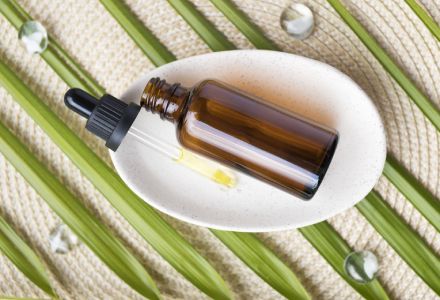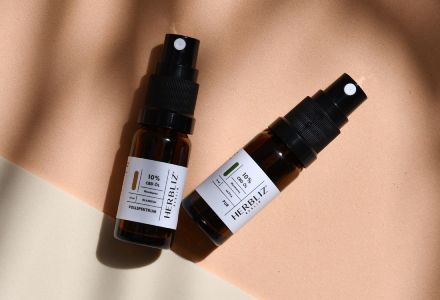1. CBD can be prescribed as medication
Medical cannabis is often associated with THC, the intoxicating cannabinoid that is still a scheduled drug in many countries. Some studies show THC can potentially support patients with symptoms of certain severe conditions, such as MS or some side effects of chemotherapy. But not all cannabis-based medication contains THC.
While there is not enough evidence to tell for sure what Cannabidiol can and cannot do, anecdotal evidence and early studies have provided enough information for pharmaceutical companies to create CBD based medication.
Epidyolex is an example of a medical cannabis product that does not contain any THC. Used by both children and adults with epilepsy, Epidiolex is a highly purified liquid that contains high amounts of CBD.
Please note that medical cannabis products with CBD have to be prescribed by a medical specialist. This is due to the high CBD content in each dose, exceeding the amounts recommended for healthy individuals.
2. CBD is not a drug, according to the European Court of Justice
According to the ruling of the European Court of Justice published in November 2020, CBD is not a drug.
As a non-intoxicating, and generally well tolerated compound, the EU court does not see any point in keeping it on the list of scheduled drugs.
The ruling finally put an end to the European debate on how to think and talk about CBD. However, there is still no unified European cannabis or CBD policy. Each EU country is responsible for setting up its own CBD rules, and there are still places in Europe where CBD can only be sold in products designed for topical use only.
3. CBD can be made in labs
Scientists can produce synthetic CBD in a lab environment. Synthetic CBD is any CBD that doesn’t come from hemp or marijuana. It might not be very popular yet, but the debate on the benefits and shortcomings is heated.
Those who believe synthetic CBD might be the future of Cannabidiol point out that synthetic CBD will always be purer than natural CBD. Extracting pure CBD (CBD isolate) from hemp requires multiple steps that strip the CBD extract from any natural hemp compounds in order to achieve pure CBD. Such steps are not necessary when CBD is produced in the lab.
Opponents point out that synthetic CBD might not provide the same effects as natural CBD, as it is made and consumed in isolation from all the other compounds found in hemp. Some scientists believe that these other compounds might play a role in improving the potential effectiveness of CBD.
Last but not least, there is a discussion on the pricing and efficiency. The proponents say that producing CBD in a lab might be cheaper and more efficient when done on a large scale. Opponents point out that there is no proof to that, and by producing synthetic CBD, we are taking away all of the ecological benefits of growing hemp.
4. Pets may benefit from CBD, but should avoid THC
All animals have an endocannabinoid system.
Research on how CBD can impact animals and their endocannabinoid system is scarce, and what does exist is often not conclusive. Most evidence is anecdotal and is told by vets or pets owners who saw an improvement after having given CBD to their anxious or sick pets, usually after running out of other options.
If you are curious about including CBD in your pet’s diet, make sure to use products that are completely THC-free, and ideally sold by pet-friendly brands. In countries where recreational cannabis is legal, many cases of accidental pet poisoning have been reported, and most of them are associated with the adverse reaction to THC animals tend to have.
If your pet is suffering from anxiety or is dealing with painful inflammations, talk to a vet to see if adding CBD to its diet might be helpful.
5. Elephants at the Warsaw Zoo take CBD to deal with anxiety
Fredzia, an elephant living in a Polish zoo, has been given CBD to help her deal with the stress of losing one of her life companions. Erna, an elderly friend of Fredzia, recently passed away, leaving Fredi confused and sad. She was not getting along with her other female companion, Buba, and the whole experience was taking a toll on this normally happy and cheerful elephant.
In order to see if CBD could help Fredzia and the other elephants adjust to the change, the Warsaw zookeepers administered CBD oil to the elephants' mouths or added it to their food.
The experiment started in 2020, and we don’t have the results yet, but we hope that Fredzia is getting better.
6. CBD is not a new discovery
Even though the legal status of CBD has only recently changed, allowing us to take advantage of its potential benefits, Cannabidiol has actually been known for decades.
This cannabinoid was discovered in the early 1940s by an American plant chemist called Dr Roger Adams. He even patented the technology he used to achieve it.
Dr Adams then moved forward, researching many other aspects of cannabis. He even managed to synthesize THC in his lab.
He felt strongly about the potential benefits of the plant (and its many compounds) but was constrained in expressing his thoughts freely due to prohibition, which started just 2 years before his discovery of CBD.
7. CBD oil and hemp oil are not the same
A common misconception among CBD users is that CBD oil and hemp oil are the same thing.
CBD oil is a product containing CBD (Cannabidiol) extracted from legally grown hemp. Hemp oil, on the other hand, is a food product made from hemp seeds.
Hemp oil (also known as hemp seed oil) is made from cold-pressed hemp seeds, and does not contain any CBD. This is because hemp seeds do not contain any CBD.
Interestingly, some CBD oils will contain hemp seed. All (legal) CBD oil you buy for consumption will include Cannabidiol and a carrier oil.
A carrier oil is necessary in order to allow for the proper digestion and dosing of CBD. Interestingly, some CBD oils will contain hemp seed oil as a carrier oil.
8. CBD deteriorates when exposed to light
Have you noticed how most CBD oils are sold in dark bottles? This is not just for aesthetics.
CBD is not invincible. When exposed to UV rays, CBD deteriorates. Amber and black glass bottles protect the precious liquid from that happening.
This is also why you are always advised to store your products away from direct sunlight.
The sun will not make your products unusable or expire any faster. Instead, it will simply decrease the CBD potency of the product. But since CBD is the main reason why you bought it in the first place, it might be a good idea to keep the product stored in a dark place.
9. Not all CBD is equal
Not all CBD is the same.
First of all, CBD extracted from high THC cannabis plants is still illegal in most parts of the world. Only CBD extracted from hemp with less than 0,3% THC is considered legal in various European countries.
Secondly, consumer products made from non-organically grown hemp are significantly inferior to those made using organically grown hemp.
Hemp is a highly absorbent plant, and when grown on soil that contains toxins and heavy metals, or that has been exposed to various pesticides and herbicides, hemp will clean it up. Unfortunately, this means that products made from such hemp will most likely absorb these toxins and getcontaminated, becoming potentially harmful to human health.
Therefore, it is extremely important you only buy products made with certified, organically grown hemp.
10. CBD might counteract some of the side effects of THC
We know CBD and THC are very different. While both are cannabinoids, our bodies react to them differently.
Breeders responsible for creating new strains of cannabis (grown for recreational purposes) often focus on increasing the THC content. However, scientists are discovering cannabis is a bit more complex than that. Early research suggests CBD might actually play an important role when consumed together with THC.
Some studies suggest CBD might be able to prevent, or counteract, some of the side effects of THC. If this is indeed true, discovering the perfect ratio of CBD to THC could potentially be life-changing for both recreational and medical cannabis users.




